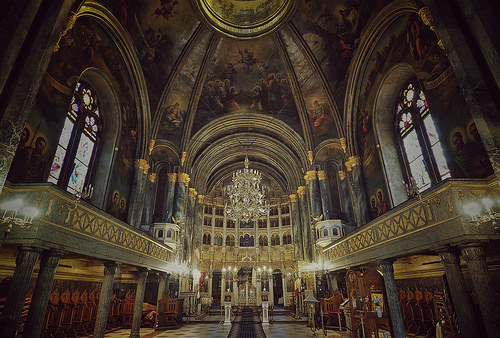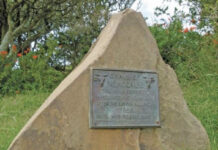
Bradly Billings
Earlier this year I had occasion to spend a few days in Romania, on the way home from a pilgrimage through the Holy Land. One thing that was very noticeable, walking the streets of Bucharest, was the renewed prominence of the Orthodox Church. It was commonplace to pass priests dressed in distinctive black robes, indeed I sat next to one on the plane coming over from Tel Aviv.
Christianity, which had been actively discouraged, sometimes violently, during the Communist period stretching from the end of the Second World War to the fall of the dictatorship in 1989, is enjoying a Romanian renaissance, that has returned it very much to a place of prominence and importance in national life. Loudspeakers broadcast the service taking place inside the main church in the city centre to passers-by, many of whom stop to listen and pray; there are colourful murals and mosaics on the external church walls, depicting Christian scenes; and what were once neglected and declining communities of monks and nuns are again flourishing all over the country.
The Communists never eradicated Christianity completely, but its observance was actively discouraged, and often dangerous – older Romanians tell of midnight baptisms, and of weddings conducted in secrecy. Once the restraining force of state sponsored socialism had gone, however, the church returned to the place of prominence it had enjoyed in the past. Although I did not stay long enough to test the theory, it seemed evident to me that the Romanians had greatly missed the presence and voice of their church as it fell silent under the force of communist intimidation.
As Orthodoxy is to the Romanians, so is Western Christianity to Australia and the many other nations of the world, and their peoples, for whom the Judeo-Christian tradition lies at the very heart of, and forms the very foundations of, the political, cultural and social conventions and traditions on which they were founded. The Christian faith, flourishing as it once did across Europe and Great Britain, influenced the development of philosophical, social and political thinking in those parts of the world, and the many other places to which they were brought. It helped to shape the development of the rule of law and what became the Westminster system of political democracy, together with the great socio-political statements, such as the United States Declaration of Independence, and the very first words of the Constitution of our own country, Australia, the preamble to which says that the people of the former British colonies making up the continent, ‘humbly relying on the blessing of Almighty God, have agreed to unite in one indissoluble Federal Commonwealth under the Crown…’
Furthermore, much of Western art, literature, and other cultural expressions, could not be understood without reference to the Christian faith. That same faith gave impetus to what we now know as science, just as it inspired great philosophical movements including the Enlightenment itself. Christians have founded organisations and institutions that have benefited, and which continue to benefit, society, contributing to the greater good in all manner of ways – from benevolent movements such as the Salvation Army, to hospitals and aged care facilities, to places of learning and education, and so many more. None of this is going anywhere soon.
Despite this history and the ongoing presence of the Christian faith and its churches among us, it is commonplace, indeed de rigour for whole institutions such as the ABC, for Christianity to be mocked at will, ridiculed and laughed at, and its adherents sneered at and derided, in a way that adherents of other religions, and one in particular, would never be. This is a very curious thing for we are told constantly that we live in a multicultural society, one of great diversity, marked by inclusivity, tolerance, respect and cohesion for all, and I do not for a moment deny that; conversely, I warmly affirm it. Australians are wonderfully tolerant people, and our history is a story of the relatively peaceful embracing of newcomers and migrants, into the mainstream of Australian life and culture. Thus our shared history fosters a sense of acceptance that it is right that those who have come to this country from other parts of the world will want to celebrate their culture and identity, and maintain their language, religion, and tradition, and indeed, we have whole government departments and other institutions, many funded entirely by the taxpayer, to facilitate this. We celebrate and affirm the many cultures that make up our society in all of their rich diversity. And, of course, it is right also for there to be a special place of prominence and importance for the first peoples of this land and their ancient culture. No one, me included, would deny any person, indigenous, migrant, or other, the right to express pride in their identity, language, culture and religion, and the opportunity to freely celebrate it. We make room for this in all manner of ways. Our own Australian Football League even has an indigenous round, and a multicultural round.
The great paradox in all of this is that we seem to celebrate and affirm every culture, religion and tradition in this country, except one – the one on which our very nation was founded, flourished, and became the great place it is today. For, whilst secular universities teach Islamic sharia law to their students, there is no subject in Christian canon law. Whilst those who are not people of faith freely mock and ridicule Christian beliefs and practises, if a Christian group holds a meeting to discuss its opposition to same sex marriage, a mob gathers to hurl abuse and intimidate those seeking to attend. Whilst adherents to some faiths and political movements freely and loudly advocate for the destruction of ‘the West‘ in both public and private settings, Christian bishops and pastors are hauled before government funded tribunals and ‘human rights’ bodies for merely stating what has been Christian teaching for centuries. It goes without saying, of course, that there is no ‘Christian round’ in the AFL season.
Christianity is not perfect, nor is the Church without fault or blame for many failings of the past, most prominently of course, the disgraceful and inexcusable protection of child sex offenders that has been uncovered by the recent Royal Commission. As reprehensible as this is, it is still the case that the principles, teachings and worldview of Christianity did play an important role in informing and shaping those aspects of our corporate society and national life that are good, and which we maintain to be good, such as the fundamental equality and dignity of all people, to take just one strongly Christian concept. From the Christian nations of Western Europe sprang the rule of law, the Enlightenment and its emphasis on free speech and personal liberty, the pursuit of knowledge and love of learning, and we could go on, and on.
At one time, in the not too distant past, for this reason, the Christian faith was recognisably and tangibly interwoven through the instruments of social, political, legal and educational life, and is still there in remnant in some, for instance in the opening of parliament with the Lord’s Prayer, a tradition currently under threat from the socialist Greens. Something tells me, however, that should the march of Cultural Marxism through our schools and universities result in the final triumph of political correctness and the end of free speech that must then follow, or should sharia law be implemented, or another worldview that knows no God but power, greed and forced uniformity prevail – then, like the Romanians under Communism, the people of this nation will begin to miss Christianity, and come to lament the continued diminishing of the place and role it once occupied in our common life. For what will almost certainly follow the loss of Christianity, or its suppression by persecution, subtle or overt, will be the eventual loss too of the principles and the concepts, and the social and political institutions and conventions, it gave rise to.
And, most of all, one thing I am very sure about is this – that whatever the competing worldview, philosophy or religion seeking to usurp the place of the Judeo-Christian worldview in our common life, it does not and will not represent an improvement, nor will it be worthy of the description ‘progressive.’ It is imperative, then, that those who value tradition and wish to conserve it, stand firm in opposition to the cultural vandals who would dismantle the very infrastructure upon which our nation was built, and in doing so, destroy also its foundations.
It is especially important that those of us who claim to be people of Christian faith find our voices on this, for if we don’t or can’t, the uncommitted and the non-committed are unlikely to join us in advocating for the preservation of Christianity and the Judeo-Christian worldview, and why should they? The stakes are high, for the cost of the Christian voice falling silent will, I am convinced, be the gradual acceptance of our own marginalisation and the rise, and eventual triumph, of one or more competing worldviews. And that will diminish the common life of all Australians, whether they adhere to a religion or not.
We are, of course, celebrating today the annual celebration of the birth of Jesus Christ, which is the very essence, and the meaning and purpose of Christmas, even in the midst of everything else the season has come to be and represent. Christmas remains the one time of year when Christianity, generally speaking, is still welcomed into the public domain in 21st century Australia, and across the Western world. Leaving aside groups of joyless malcontents like the Greens, Antifa, and some inner city councils, a significant number of normal people in the community, even If they might not ever grace the inside of a church, will admire children acting out the story of the birth of Christ in costume, sing carols hailing the birth of the incarnate Son of God, and perhaps even give some thought to the significance of the events that took place some 2,000 years now on a distant field in Bethlehem.
Many Australians, of all backgrounds and experiences, will attend a church service, some for the only time of the year, or for the first time in many years. At this one time of year, in a way that is not true of other Christian festivals such as Easter, the Christian message of ‘peace on earth and goodwill to all’ continues to resonate and carry meaning, for the religious and the irreligious alike. At this one time of year, Bishops, priests and pastors are tolerated and listened to at community carols, or given column inches in the secular press, and sometimes a few minutes on radio or television.
Christmas, and its ongoing resonance and importance in our common life, therefore, gives me hope that we have not yet let go of the Christian tradition in this nation, and further, that there is still time to prevent the certain catastrophe that will result should we ever let it disappear completely. For I have no doubt we will miss the Christian church, even with all of its flaws and follies, if the day ever dawns when it is not there to enrich our common life and to give ongoing expression to the great traditions which formed the sure and strong foundations upon which our nation and our culture were built.
So a very merry, happy and holy, conservative Christmas to you all.
The Right Reverend Dr Bradly Billings is an Assistant Bishop in the Anglican Diocese of Melbourne, Australia. He has published ‘For God, King and Country,’ a study of the Anglican Church and Community during the First World War.
Photo by StefanJurcaRomania 









